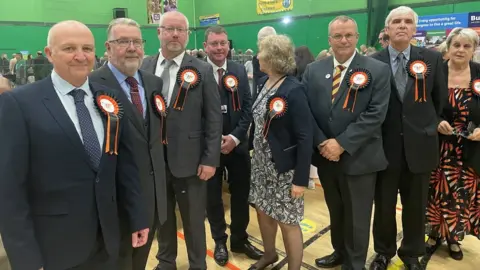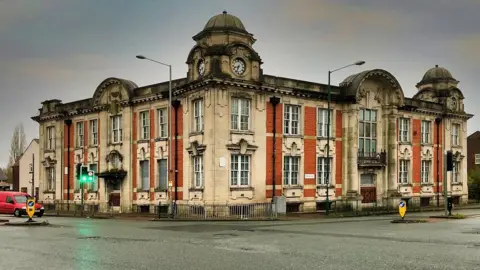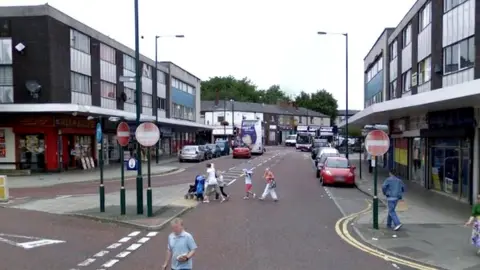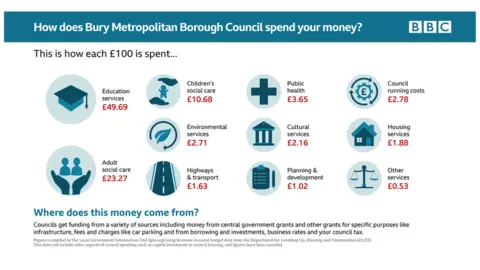Radcliffe: The town that turned its back on the big parties
 LDRS
LDRSThe recent local elections saw many voters across England reject the two major parties and turn to the likes of the Liberal Democrats and Greens instead.
But in one Greater Manchester town, people did not just turn their backs on the Tories and Labour, they actually left behind national politics completely.
Hyperlocal party Radcliffe First won eight of the nine seats available in the town's three wards on Bury Council, just four less than the Conservatives - the Labour-led authority's official opposition - took across the entire borough.
Labour, who have a strong overall majority, failed to hold on to any representation in Radcliffe, losing three seats to Radcliffe First, while the Tories saw two seats fall to the hyperlocal party.
Radcliffe First councillor Mike Smith told the Local Democracy Reporting Service the overwhelming success was "way beyond all expectations", but was a result of "the careless way both Labour and Conservatives have looked at Radcliffe".
"The feedback on the doorstep was positive in all areas [so] we expected to consolidate our position, but not on the scale we saw."
 David Dixon/Geograph
David Dixon/GeographHe said the reason for the shift to his party was down to voters' belief that the town had been abandoned.
"Radcliffe has lost its secondary schools, civic centre, leisure centre and came close to losing its library," he said.
"Its town hall was sold for a pound and the high street has been allowed to stagnate and deteriorate due to a chronic lack of investment."
He said there had been "token investment" which had seen "lamppost banners, rusty planters and benches" put in place around the town, but they were now "falling to pieces".
Such investment "without any ongoing maintenance plans is symptomatic of the careless way both groups have looked at Radcliffe," he said.
'Protest vote'
Chris Mortimer, 53, from the Ainsworth Road area, was a once traditional Labour voter, but backed Radcliffe First on 5 May.
He said there was a "feeling from a lot of folk that Radcliffe gets next to nothing compared to other areas around here".
"I wanted a more local voice on the council and I'm glad they got voted in," he added.
"If there was a general election, I'd vote on national issues, but I didn't support Labour this time."
Fellow resident Jenny Newell, 33, of Coronation Road, said people in the town were "fed up of the same old parties who promise a lot and deliver nothing in Radcliffe".
 Google
GoogleSpeaking shortly after the election results, Labour council leader Eamonn O'Brien said he believed many voters in Radcliffe had "obviously lost faith in the mainstream parties".
"We need to redouble our commitment to the town and accelerate the regeneration of the town," he said.
The day after the 5 May poll, a Radcliffe Labour post on Facebook stated that the party had "a long way to go".
"We know, regardless of any election result, we have a lot more work to do to get Labour supporters back," it said.
Conservative councillor Russell Bernstein, the new opposition leader on the authority, said his party had "failed to deliver our message" in Radcliffe.
"We believe that we should have challenged and scrutinised the impact of the Radcliffe protest vote far more effectively and much earlier," he said.
"It's been too easy to allow Radcliffe First to be seen as a protest vote and thus somehow not as political as the mainstream parties.
"As such they have not been to date subject to the same challenges that are given to all our other political opponents."
Mike Smith said he believed it was not that underestimation which had cost both parties dearly in the town, but it was a misunderstanding of what residents wanted.
"Most [residents] are politically aware and knew this [election] should be fought on local issues, not the national issues Labour fought on," he said.
"Roads, potholes, fly-tipping and the regeneration of the town and a new school were the issues.
"The green belt was also key - many people used the area for exercise during lockdown and rekindled their love of the spaces."
He said his party would now "consult, consult, consult" and "make sure people have their say in plans for regeneration", using the "amazing community groups we have" to garner opinion, as they "have their ear to the ground and know what's needed at a base level".
He added that repairing roads, creating a "secondary school that provides outstanding education to our young people" and drawing up a "regeneration plan that works for the whole town" were top of the agenda.



Why not follow BBC North West on Facebook, Twitter and Instagram? You can also send story ideas to [email protected]
